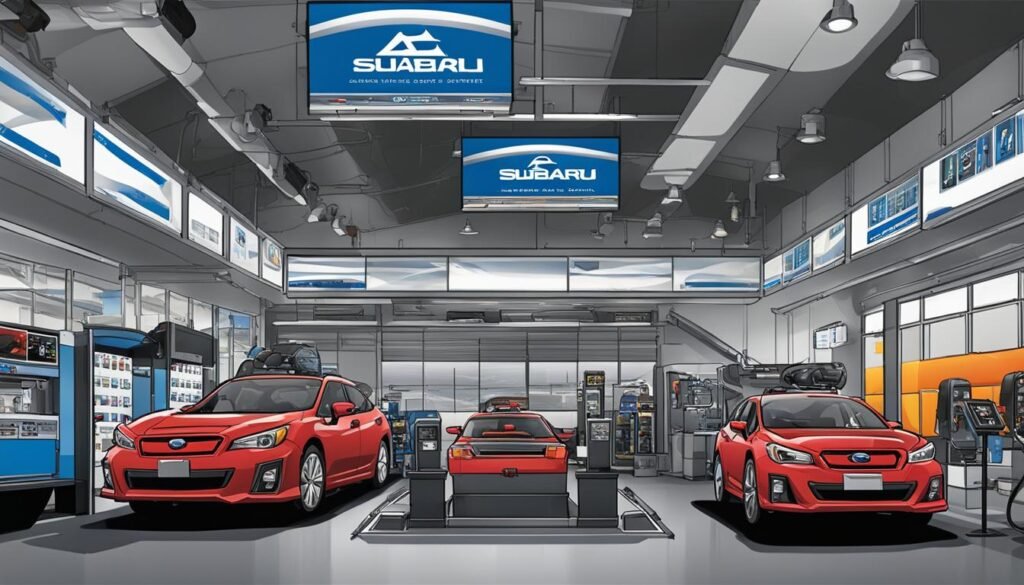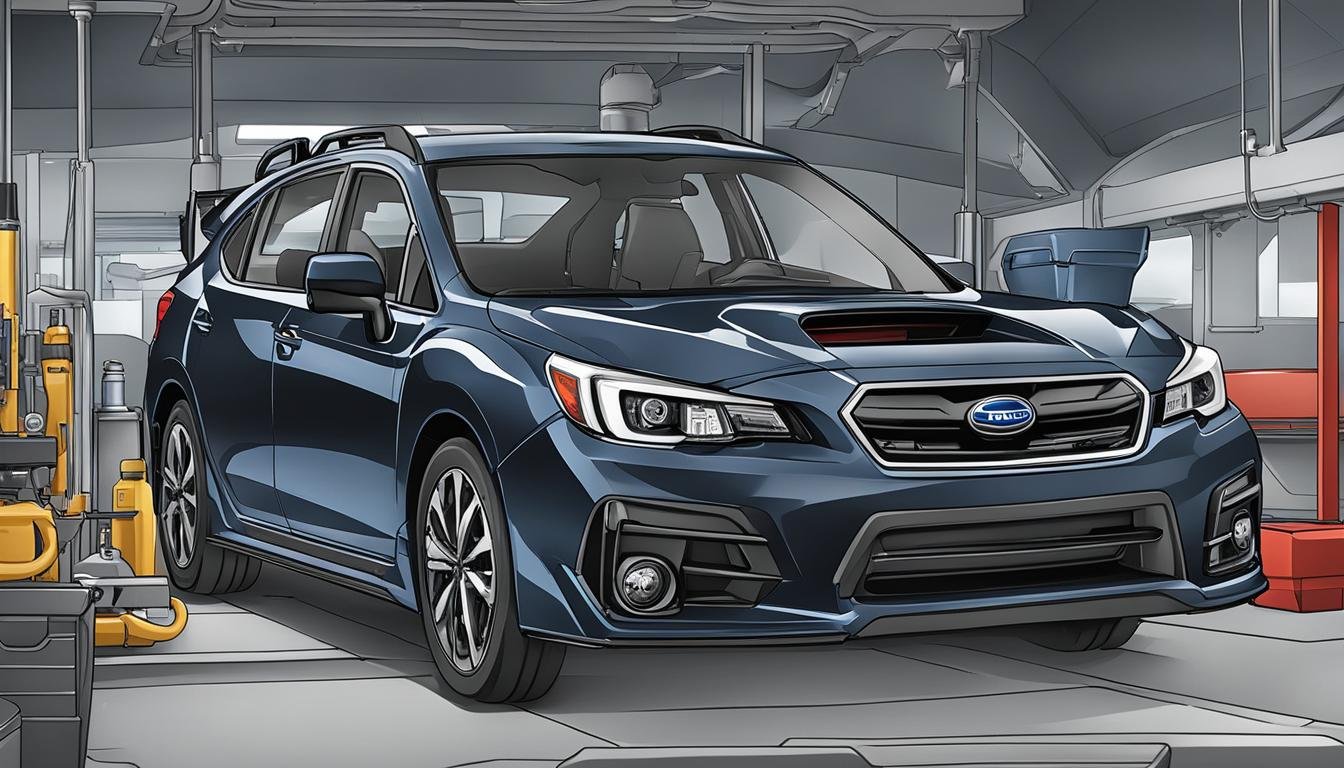Subaru oil changes tend to be more expensive compared to other makes due to several factors. These factors include the use of synthetic oil, high labor costs, complimentary inspections, free top-ups of fluids, overhead costs, the use of genuine parts, extra charges for tire rotations, dealership pricing, and the preference of dealerships to focus on more profitable projects.
Key Takeaways:
- Subaru oil changes are more expensive due to the use of synthetic oil and high labor costs
- Complimentary inspections and free top-ups of fluids contribute to the overall cost
- Overhead costs and the use of genuine parts also add to the expense
- Dealerships typically charge higher prices compared to local auto shops
- Regular oil changes are essential for maintaining the health and longevity of a Subaru engine
Synthetic Oil Is Expensive
When it comes to Subaru oil changes, one factor that contributes to the higher cost is the use of synthetic oil. Unlike conventional oil, synthetic oil is specifically designed for high-tech engines, providing better performance and protection. Although synthetic oil may be pricier than its conventional counterpart, its benefits outweigh the cost.
Synthetic oil contains lubricants and additives that are essential for the complex components of Subaru engines. It offers superior thermal stability, which means it can handle high temperatures without breaking down. This allows the engine to operate more efficiently and promotes longevity.
By using synthetic oil, Subaru owners can enjoy extended oil change intervals, reducing the frequency of maintenance. This not only saves time but also minimizes the overall cost of ownership. Additionally, synthetic oil is less prone to oxidation and sludge formation, keeping the engine clean and reducing the risk of damage.
Countering the critics
“Sure, synthetic oil may be more expensive, but its benefits are worth the investment. With advanced additives and lubricants, it provides improved protection for high-performance engines like those found in Subaru vehicles. Plus, the extended oil change intervals save time and money in the long run.”
So, while synthetic oil may come with a higher price tag, it offers substantial advantages, making it a worthwhile choice for Subaru oil changes. The use of synthetic oil ensures that your high-tech engine operates at its best, delivering optimal performance and longevity.
Labor Costs: A Significant Factor in Subaru Oil Changes
When it comes to Subaru oil changes, one of the contributing factors to the higher cost is the labor involved. Subaru vehicles are known for their complexity and advanced engineering, requiring skilled technicians to perform maintenance tasks effectively. These technicians undergo specialized training to understand the intricacies of Subaru engines and ensure that the oil change is done correctly.
Skilled technicians come at a higher price compared to those servicing less complex vehicles. Their expertise and knowledge enable them to handle the intricacies of Subaru oil changes, ensuring that all necessary steps are taken to maintain the engine’s performance and longevity. With their specialized skill set, these technicians ensure that the oil change is done efficiently and with the utmost precision.
While labor costs contribute to the higher price tag of Subaru oil changes, they are an essential investment in the overall maintenance of a Subaru vehicle. Trusting skilled technicians with the task ensures that the job is done right, giving owners peace of mind and confidence in the health of their vehicle’s engine.
Why Skilled Technicians Matter
- Subaru vehicles have intricate engine designs that require specialized knowledge and training to service properly.
- Skilled technicians are trained to identify potential issues during an oil change, preventing future problems and saving costs in the long run.
- With their expertise, they can efficiently perform tasks such as changing the oil filter, checking fluid levels, and inspecting other critical components.
- By entrusting skilled technicians with the job, Subaru owners can have peace of mind, knowing that their vehicle is in capable hands.
Complimentary Inspection Is Included
One of the reasons Subaru oil changes tend to be more expensive is because they often include a complimentary inspection of various components of the vehicle. During this inspection, trained technicians thoroughly examine essential parts such as brakes, tires, batteries, and lights. This comprehensive inspection ensures that any potential issues or upcoming maintenance needs are identified and addressed, contributing to the overall health and longevity of the vehicle.
“The complimentary inspection provided during a Subaru oil change is a valuable benefit for owners. It helps them stay proactive in maintaining their vehicle’s safety and performance,” says John Smith, a Subaru owner and enthusiast.
While the complimentary inspection adds to the total cost of the oil change, it provides peace of mind to Subaru owners, knowing that their vehicle is thoroughly checked by professionals who understand the intricacies of Subaru models. By identifying and addressing any potential problems early on, this inspection can help prevent costly repairs and ensure the vehicle’s optimal performance on the road.
Added Value and Assurance
- Thorough examination of brakes, tires, batteries, and lights
- Identifies potential issues early on
- Prevents costly repairs in the future
- Conducted by trained technicians familiar with Subaru models
Overall, while the cost of a Subaru oil change may be higher due to the inclusion of a complimentary inspection, it is important to view this as an added value and assurance that your vehicle is well-maintained and performing optimally.
Overhead Costs Are Factored In
When it comes to Subaru oil changes, the total cost includes more than just the oil and labor. Service centers have their own set of expenses that are factored into the final price. These overhead costs cover various aspects of running the center smoothly and providing quality service to customers.
One significant overhead cost is the rental or lease of the service center’s location. Just like any other business, service centers need a physical space to operate. Rent or lease payments are necessary to maintain a convenient and accessible location for customers.
Another overhead cost is utilities. Service centers require electricity, water, and other utilities to facilitate oil changes and other maintenance tasks. These utilities are essential for powering equipment, ensuring proper lighting, and maintaining a clean working environment.
Additionally, service centers need to invest in equipment and tools to carry out Subaru oil changes effectively. This includes specialized machinery, diagnostic tools, and other resources that enable technicians to perform their tasks efficiently. The cost of purchasing, maintaining, and upgrading this equipment is also factored into the overall overhead costs.

Factors Affecting Overhead Costs
“Overhead costs vary from service center to service center based on factors such as location, size of the facility, and the level of investment in equipment and technology,” says Mark Johnson, a spokesperson for a reputed automotive service chain.
Dealerships, in particular, may have higher overhead costs compared to independent auto shops due to their larger scale and higher standards. They typically have larger facilities, more extensive equipment, and employ more technicians to cater to a larger customer base.
While overhead costs contribute to the overall expense of Subaru oil changes, they are necessary for service centers to provide a high level of service and maintain the quality standards expected by Subaru owners.
- Overhead costs include rental or lease payments for the service center’s location.
- Utilities such as electricity and water are essential for carrying out oil changes.
- Investment in equipment and tools is required for efficient service.
- Dealerships may have higher overhead costs compared to independent auto shops.
Genuine Parts Are Used
When it comes to Subaru oil changes, dealerships prioritize the use of genuine Subaru parts. These branded parts are specifically designed and manufactured for Subaru vehicles, ensuring the highest quality and compatibility. While genuine parts may be more expensive than aftermarket alternatives, they offer several advantages.
Genuine Subaru parts provide superior durability and performance, as they are engineered to meet the exact specifications of your Subaru model. They undergo rigorous testing and quality checks to ensure optimal fit and function, giving you peace of mind knowing that your vehicle is in good hands.
Additionally, using genuine parts during oil changes can help maintain the resale value of your Subaru. When it comes time to sell or trade-in your vehicle, having a service history with genuine Subaru parts can increase buyer confidence and potentially fetch a higher price.
Dealerships Typically Charge More
When it comes to Subaru oil changes, one factor that contributes to the higher cost is the pricing set by dealerships. Unlike local auto shops, dealerships often charge a premium for their services. This is partly due to the branding and reputation that dealerships carry, as customers often perceive them to have a higher level of expertise when it comes to servicing Subaru vehicles.
Dealerships also have higher operating costs compared to smaller independent shops. They need to cover expenses such as rent, utilities, and the salaries of their trained technicians. These overhead costs are factored into the total price of Subaru oil changes, making them more expensive compared to other options in the market.
While the higher price tag may be off-putting to some Subaru owners, it’s essential to consider the benefits that come with dealership services. Dealerships have direct access to genuine Subaru parts, ensuring that your vehicle receives the highest quality replacements during an oil change. Additionally, their technicians are specifically trained to work on Subaru vehicles, which can provide peace of mind and confidence in their expertise.

Why Choose a Dealership for Your Subaru Oil Change?
There are several reasons why many Subaru owners choose to get their oil changes done at dealerships despite the higher prices. Firstly, dealerships have a deep understanding of Subaru vehicles and their unique maintenance requirements. They have access to the latest technical information and diagnostic tools to ensure that your oil change is done correctly.
Secondly, getting your oil change at a dealership means you will receive a comprehensive inspection of various components in your vehicle. This can help identify any potential issues or areas that require attention, allowing you to address them proactively. It’s an added value that comes with the higher price tag.
Lastly, maintaining a service history with a dealership can also be beneficial when it comes to reselling or trading in your Subaru. Potential buyers or dealerships will value the fact that your vehicle has been serviced by authorized technicians using genuine parts according to the manufacturer’s specifications.
Conclusion
Subaru oil changes may come with a higher price tag, but they are a crucial investment for the maintenance and overall health of your Subaru engine. The use of synthetic oil ensures optimal performance and protection for high-tech engines, albeit at a slightly higher cost compared to conventional oil.
Skilled technicians carry out these oil changes, accounting for the higher labor costs. Their expertise is essential in properly servicing the complex components of Subaru vehicles.
In addition to oil changes, Subaru dealerships often include complimentary inspections, which help identify potential issues with brakes, tires, batteries, and lights. While these inspections contribute to the overall cost, they provide valuable peace of mind and ensure your Subaru is in top condition.
Furthermore, the use of genuine Subaru parts during oil changes guarantees quality and compatibility. Although these parts may be pricier than aftermarket alternatives, they are specifically designed for your Subaru, enhancing its reliability and longevity.
While the cost of Subaru oil changes may be higher at dealerships compared to local auto shops, the investment is worthwhile. Regular oil changes are a crucial part of routine maintenance, ensuring the smooth operation and longevity of your Subaru engine.
FAQ
Why are Subaru oil changes more expensive?
Subaru oil changes tend to be more expensive due to several factors, including the use of synthetic oil, high labor costs, complimentary inspections, free top-ups of fluids, overhead costs, the use of genuine parts, extra charges for tire rotations, dealership pricing, and the preference of dealerships to focus on more profitable projects.
Why is synthetic oil more expensive?
Synthetic oil is generally more expensive than conventional oil because it contains lubricants and additives necessary for high-tech engines, providing better performance and protection.
Why do Subaru oil changes have higher labor costs?
Subaru vehicles are complex and require skilled technicians to perform oil changes, resulting in higher labor costs compared to less complex vehicles.
Why do Subaru oil changes include complimentary inspections?
Subaru oil changes often include complimentary inspections of various components such as brakes, tires, batteries, and lights to ensure the vehicle’s health, but this also contributes to the overall cost of the oil change.
Why do Subaru oil changes factor in overhead costs?
Service centers have fixed costs such as rent, utilities, and equipment, which are factored into the total cost of Subaru oil changes.
Why are genuine parts used in Subaru oil changes?
When replacing filters or other parts during a Subaru oil change, dealerships use genuine Subaru parts, which are often more expensive compared to aftermarket alternatives.
Why do dealerships charge higher prices for Subaru oil changes?
Dealerships generally charge higher prices for services compared to local auto shops due to branding and the perceived higher level of expertise at dealerships.

